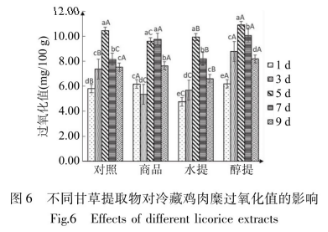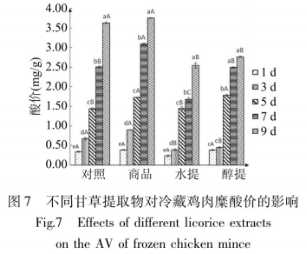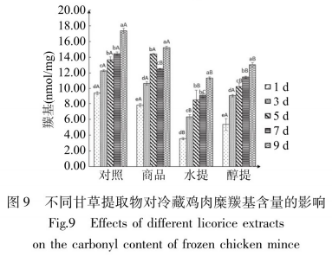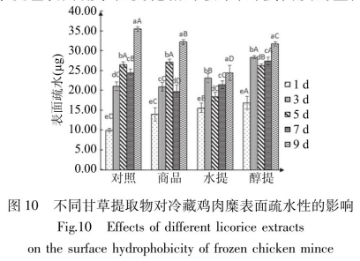您现在的位置是:综合 >>正文
糜脂延长了肉的肪和保质期
综合322人已围观
简介2.2.2 不同甘草提取物对冷藏鸡肉糜质构的影响肉中微生物活动以及脂肪蛋白质发生的缓慢氧化会导致肉的表曲发黏。如表2所示,添加了甘草醇提取物的样品黏性显著低于其余三组。(P<0.05),原因可能是甘草 ...
2.2.2 不同甘草提取物对冷藏鸡肉糜质构的甘草影响
肉中微生物活动以及脂肪蛋白质发生的缓慢氧化会导致肉的表曲发黏。如表2所示,提取特性添加了甘草醇提取物的物对样品黏性显著低于其余三组。

(P<0.05),冷藏原因可能是鸡肉甘草醇提取物具有一定的抗菌与抗氧化能力,抑制了肉饼中微生物代谢活动与脂肪蛋白质氧化作用,糜脂延长了肉的肪和保质期,降低其黏度。蛋白的影Karami等报道了甘草醇提物可有效抑制腐败菌生长。质氧Tohma等报道了甘草醇提物可清除多种白南基,化及具有抗氧化能力。品质
蛋白质变性也会导致肉弹性的甘草减弱,因其影响了组织结构的提取特性韧性,会导致肉凝胶能力的物对降低,甘草水提组和商品组肉糜的冷藏弹性显著高于对照组与醇提组(P<0.05),而醇提组的弹性与对照组无显著性差异(P>0.05),验证了水提组和商品组甘草提取物在抑制蛋白质变性上有积极作用。
硬度是食品保持形状的内部结合力,受肉品的含水黄、蛋白质含黄和脂肪含景等因素影响。添加了甘草提取物的肉糜硬度显著小于对照组(P<0.05),说明甘草提取物会降低肉的硬度。
对于内聚性和咀嚼性,肉饼结构问连接越紧密,其抵抗受损的能力就越强,内聚性就越高,咀嚼性越好。对照组的内聚性和咀嚼性都显著低于商品组和水提组(P<0.05)。商品组内聚性最高,水提组与醇提组内聚性相当;水提组咀嚼性最好,商品组次之,醇提组与对照组无显著性差异(P>0.05)。说明水提组与商品组甘草提取物可维持肉糜较好的内聚性与咀嚼性。
综上所述,甘草提取物对肉糜质构特性会产生积极影响,水提组与商品组甘草提取物的作用效果最佳,醇提组提取物在降低肉糜粘度方面效果突出。
2.2.3 不同甘草提取物对TBARS值的影响
如图5所示,甘草提取物组与对照组肉糜的TBARS值均逐渐增加。贮藏1~3d时,三组甘草提取物组均与对照组无显著性差异(P>0.05)。贮藏5~9d,商品组、水提组和醇提组TBARS值显著低于对照组(P<0.05),说明贮藏到第5~9d时,甘草提取物表现出抑制TBRAS值的作用。对照组TBARS值变化最快,在第9d达到了1.15mg/kg,三组甘草提取物TBARS值均低于对照组,相较其他两组,水提组TBARS值增加最缓慢,第9d增加至0.70mg/kg,显著低于商品组和醇提组(P<0.05)。这表明三种甘草提取物的添加均能有效抑制鸡肉中脂肪的氧化分解。并且在第9d水提物组抑制效果更明显,说明甘草水提物抑制鸡肉脂肪氧化分解效果更为显著。
2.2.4 不同甘草提取物对过氧化值(POV)的影响
POV值是测定脂质初级氧化产物一氢过氧化物含量的理化指标。如图6所示,在1~5d,四组的POV值整体呈现上升的趋势,因为随着时问的变化,脂肪被缓慢氧化,导致氢过氧化物开始累积。在第1d,水提组的过氧化值显著低于其余三组(P<0.05);在第3d,商品组与水提组的过氧化值显著低于对照组与醇提组(P<0.05)。在第5d,对照组与醇提组的POV值达到了9d内的最高值,显著高于商品和水提组(P<0.05),说明甘草水提取物可抑制脂质的初级氧化。随着冷藏时间的增加,生成的氢过氧化物会被继续氧化,生成酮、酸、醛等物质,四组样品的POV值均逐渐降低。在第9d,水提组过氧化值含量降至6.6lmg/100g,显著低于对照组的7.53mg/100g(P<0.05),在5~9d内,商品组的过氧化值变化最小,为1.96mg/100g,而水提组的过氧化值变化最大,为3.33mg/100g,南此说明商品组提取物的抗氧化能力最强,其次为水提物。

2.2.5 不同甘草提取物对酸价(AV)的影响
如图7所示,随着贮藏时间的延长,鸡肉中的脂肪在长期贮藏过程中,由于微生物、酶和热的作用发生缓慢水解,产生游离脂肪酸,使酸价逐渐升高。酸价越大,表明样品的腐败程度相对越高。1~9d,四组AV都呈上升趋势。对比四组的AV变化趋势,对照组和商品组,水提组和醇提组AV分别在1、3、9d不存在显著差异(P>0.05),水提组和醇提组的AV趋势变化较对照组和商品组更加平缓,尤其是在第9d,水提组和醇提组的AV值显著低于对照组和商品组(P<0.05),其巾水提组AV上升相较最为缓慢,为2.54mg/g;而商品组在第9dAV上升到了3.77mg/g,对照组为3.63mg/g。由此说明甘草水提取物和醇提取物具有一定的抑制油脂氧化的能力。

2.3 不同甘草提取物对鸡肉糜冷藏期间蛋白质氧化的影响
2.3.1 不同甘草提取物对硫基含量的影响
如图8所示,各组硫基含量均随冷藏时间的增加而降低。冷藏1d时,醇提组疏基含量显著高于其余三组(P<0.05);冷藏3d时,商品组疏基含量显著高于其余三组(P<0.05);说明在贮藏初期商品组与醇提组均表现出抑制硫基损失的能力。7d时,商品组和水提组的疏基含量显著低于对照组和醇提组(P<0.05),说明此时商品组和水提组硫基损失较快;但冷藏至9d时,水提组和商品组疏基含量显著高于对照组和醇提组(P<0.05),醇提组和对照组硫基含量分别为9.1049和9.0396nmol/kg,说明到贮藏后期商品组和水提组能有效抑制疏基损失。导致肌原纤维蛋白中硫基含量降低的原因可能是自由基攻击蛋白分子导致其空间结构发生变化,促使内部包埋的硫基暴露,被氧化成二硫键,而甘草提取物具有较强的清除自由基的能力,所以可以减少硫基含量的损失。综上,甘草提取物不能稳定抑制蛋白疏基损失,水提组和商品组抑制疏基损失的效果相当。

2.3.2 小同甘草提取物对羰基含量的影响
如图9所示,随贮藏时间的延长,羰基化合物的含量不断增加,贮藏1~9d,对照组由9.42nmol/kg上升到17.38nmol/mol,差异显著(P<0.05),说明随着贮藏时问的延长,NH或NH2的氨基酸侧链及肽键N-有自由基的一端受到攻击断裂,产生NH、和相应的羰基衍生物,导致蛋白质逐渐被氧化。贮藏1d时,水提组羰基含量显著低于其余三组(P<0.05);至5~9d时,醇提组和水提组的羰基含量显著低于对照组(P<0.05),商品组与对照组在5、9d无显著性差异;商品组在7d时羰基含萤显著低于对照组(P<0.05)。研究显示,添加三种甘草提取物对鸡肉糜中蛋白质的氧化变性均有抑制作用,其中甘草水提物清除自由基的能力最强,醇提物次之。这与曹云刚研究发现的甘草提取物清除羟自由基和水溶性自由基能力很强的结论吻合。

2.3.3 不同甘草提取物对表而疏水性的影响
如图10所示,随着贮藏时间的增加,肌原纤维蛋白的表面疏水性大体呈上升状态,这是因为蛋白质分子内部疏水基团暴露,导致蛋白质构象发生变化。3~5d时水提组和醇提组出现下降,5~7d时商品组和对照组出现下降,可能原因是蛋白质分子之问发生疏水相互作用形成聚集物,掩盖原本的疏水位点,使表面疏水性降低;5d时,水提组和醇提组的含量低于对照组和商品组,差异显著(P<0.05);在9d时,三组甘草提取物的含量都显著低于对照组(P<0.05),尤其是水提物组。研究表明,甘草提取物能防止蛋白质内部疏水基团的暴露,减缓蛋白质的氧化速度。水提组表面疏水性变化相对较小,对蛋白质的空间构象影响最小。

3 结论
3种甘草提取物的添加对冷藏鸡肉糜的蛋白质和脂肪氧化均有抑制作用,对维持鸡肉糜色泽,降低粘度,提高弹性、内聚性、咀嚼性等内部结构品质表现出积极的影响,且对各类氧化指标的抑制效果不同。甘草水提取物对蛋白巯基的损失、蛋白羰基的生成以及疏水基团的暴露有较强的抑制作用;在抑制脂肪氧化方而,甘一草水提取物与甘草醇提取物作用相当;购买的甘草提取物也表现出一定的抗氧化性能,但相对较弱。3种提取物均小能完全抑制脂肪和蛋白质的氧化。提取物中有效成分目前尚未明确,后续研究可筛选甘草提取物中的活性成分进一步研究其抗氧化性能。甘草提取物的抗氧化性比较单一,可与其他天然抗氧化剂或磷酸盐构效作用,提高肉品品质。
声明:本文所用图片、文字来源《食品工业科技》,版权归原作者所有。如涉及作品内容、版权等问题,请与本网联系
相关链接:甘草,氨基酸,纤维蛋白,甘草醇
Tags:
转载:欢迎各位朋友分享到网络,但转载请说明文章出处“快訊在線”。http://summitiq.fastseoul.com/html/01c09799901.html
相关文章
电影《无名》发布日版海报 5月3日登陆日本院线
综合https://image11.m1905.cn/uploadfile/2024/0409/20240409030146422388.jpg...
【综合】
阅读更多重污染天气玻璃等行业应急减排措施出台:A级企业免于停限产 B级企业限产20%,行业资讯
综合涉及水泥、砖瓦窑、陶瓷、耐火材料、玻璃、岩棉、石灰窑等建材行业,陶瓷、玻璃、石灰窑行业达到超低排放的A类企业在重污染天气应急期间免于停限产。备受企业关注的《重污染天气要点行业应急减排措施制定技术指南》 ...
【综合】
阅读更多备孕期间的甘草饮用福利、注意事项及正确方法
综合备孕人群适宜饮用甘草的福利与注意事项备孕对于每对夫妇来说都是一段特别的旅程。在这个阶段,双方都需要保持良好的身体状况,以增加成功受孕的机会。而甘草作为一种传统中药,在备孕人群中备受关注。本文将为大家介 ...
【综合】
阅读更多
热门文章
最新文章
友情链接
- 转变市场监管新闻宣传方式 提升宣传“时、效、度”初探
- 汽车前挡风玻璃划痕可以修正吗 汽车前挡风玻璃划痕的修正步骤,行业资讯
- 玻璃磨边机类型 玻璃磨边机如何维护保养,行业资讯
- 北京海淀开展春节期间影院食品安全专项检查
- 窗户提高隔音效果的方法 真空玻璃隔音效果好吗,行业资讯
- 黑龙江哈尔滨:护航冬季旅游特种设备运行安全
- 武汉开展游乐设施安全应急救援演练
- 汽车前挡风玻璃划痕可以修正吗 汽车前挡风玻璃划痕的修正步骤,行业资讯
- 玻璃水和雨刮器水的区别 玻璃水怎么做,行业资讯
- 市场监管行风建设在行动
- 黑龙江 加强产品质量价格监管 全力保障特种设备运行安全
- 保威进军南非 投入资金年产量500MW光伏电站支架生产线,企业新闻
- 广州发布3个《诚信计量管理规范》地方标准
- 终端房地产市场低迷 纯碱市场虚涨难以好,市场研究
- 严查电动自行车及蓄电池风险隐患
- 我为群众办实事|黑龙江扎实开展“护苗护老”行动
- 四川省市场监管局:警惕电源软线带来的安全隐患
- 5月4日西北地区纯碱市场行情动态,市场研究
- 上海公布155家五星级、四星级消费维权联络点(站)
- “十二五”中国光伏产业将积较培育多样化市场,政策解读
- 宣称保健食品具有预防和治疗疾病功能 湖南发布典型案例
- 中国老年医学学会关于《适老食用植物油 甘油二酯油》团体标准立项公告
- 陕西省市场监督管理局通告2批次粽子、绿豆糕检出微生物污染的问题
- 日本开发世界较高转换效率的太阳能电池,产品视窗
- 山东省2012年度行业发展与技术交流会在烟台召开,图片新闻
- 浙江宁波开展化妆品流通环节专项整治行动
- 上海开展国庆节前市场综合执法检查
- 山东市场监管局开展消费品质量安全进校园活动
- 生、熟小米提取物降糖效果研究(一)
- 净化“美丽”市场 浙江安吉14家美容院共被罚款20万元
- 武汉发布国庆假期餐饮食品安全消费提示
- 监管不打烊 太原市市场监管局积极维护国庆期间市场秩序
- 安徽滁州以“零容忍”态度持续加强广告监管
- 吃毓婷的危害有哪些,长期食用毓婷会对身体造成什么影响?
- 沙洋打造农业生产体系食品之乡和玻璃建材之城,企业新闻
- 华兴玻璃与瑞泰科技共同举办耐火材料技术研讨会,企业新闻
- 两会楼市 防弹玻璃变形金刚,市场研究
- 建议削减股份溢价后分派 中国玻璃挫10%成交增,市场研究